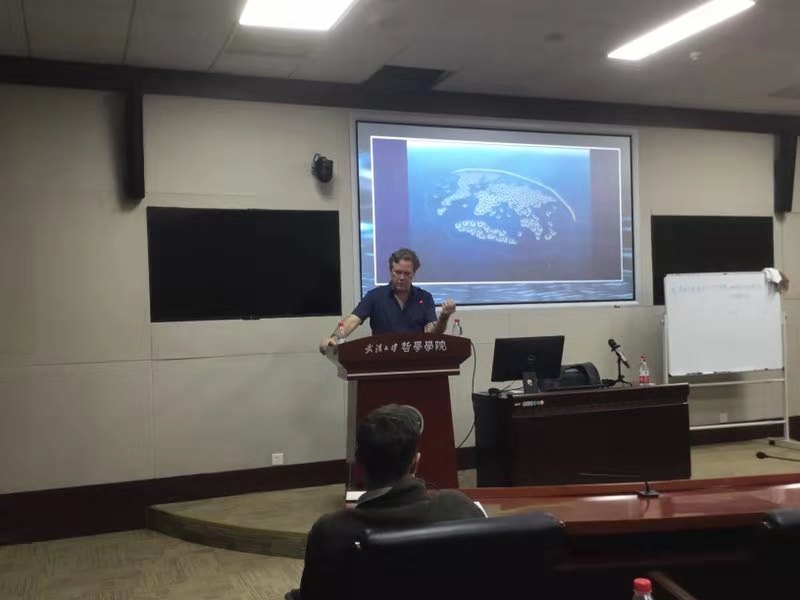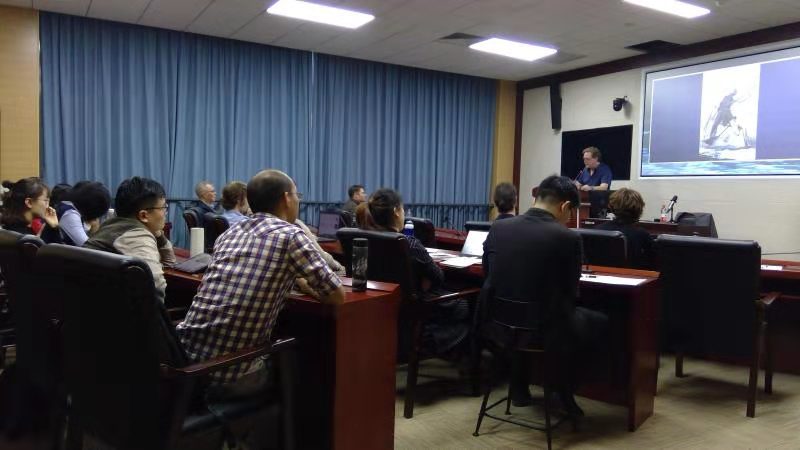On Tuesday 15:30 p.m, October 22, 2019, Professor Gregory Lambert, from Syracuse University, gave a lecture at B214 of the School of Philosophy. The theme of the lecture was “What is ‘Continental’ Philosophy?”.

At the beginning of the lecture, he reminded us that the question of “What is ‘Continental’ Philosophy?” is traditionally related to the division of analytic vs. continental camp. And he clarified by referring Gary Gutting’s writing that this division is a logical fallacy, or an improper syllogism, and has become more and more simply the product of a disciplinary order of reproduction belonging to academic philosophy in the U.K. and the United States. Therefore, he emphasized that he will abandon the identity of difference from an extrinsic, historical, relativistic and/or nationalistic prejudice from which this question has historically arisen.
After the introduction of the lecture, he proposed that the true difference is already internal to continental philosophy itself, according to the analogy of the geological fissure, crack, or fault line which is already internal to so-called continental subject of philosophy, that is the difference between what Deleuze defined in an early essay a continental and an oceanic island. Then he elaborated continental island on an etymological level, “Continent” originated from Latin continere, which means to hold together, to connect the parts into a whole, and “Continent” refers precisely to a continuous body of land bordered by water or, differently, to a continuous thought that shapes one’s identity and establishes clear borders between it and its surroundings. Following this, he employed this new division, specifically, to determine the style of philosophising that can be ascribed to the philosophies of Deleuze, Derrida, and Lyotard, in particular.
His interpretation of oceanic island came with reflections on the European oceanic island. This reflection includes four aspects, geology, history, culture, politics. He concluded his reflections on the European oceanic island by referring to Derrida’s acute interrogation of Heidegger’s “Robinsonade”. That is to say, from now on, one must begin with the presupposition that today find oneself alone on a desert island. And yet, there are no more desert islands today. Which means in the current stage of globalization, there are no more oceanic islands. Consequently, it would naturally follow from this conclusion that there can be no more oceanic philosophies from now on. No more desert islands, ergo, no more Robinsonades. Moreover, in the contemporary age, even the attempt to create a desert island philosophy would be morally suspect, since one can no longer begin philosophizing from a position of innocence and forgetting. In other words, there is no longer any “original question” in philosophy. There is only the question of difference and of repetition.

Then he turned to the continental island with Lyotard’s concept of an archipelago of contemporary political reason. The image of the archipelago is the dispersion of the idea of human community into an archipelago of “continental islands”. Before pushing his definition of Continental Philosophy, he added that he took his definition of the continental island partly from Deleuze, who said that continental islands are borne of “disarticulation, erosion, and fracture that survive the absorption of what once contained them”.
He finally delivered his definition of Continental Philosophy. It refers to no existing tradition or institution, but rather to a future region and style of thought that will only be born of further disarticulation, fracture, erosion of the earlier dichotomies and disciplinary traditions, and so on. Based on this new definition, he pictured a New Continental Philosophy.
At the end of the lecture, Professor Gregory Lambert interacted with the attending faculty members and students on the issues related to the lecture, such as the external reasons why a new continental philosophy is necessary. The professor gave a detailed explanation of this question. And the lecture ended with a round of applause.
(Photo&Written by Wang Jianqian)



